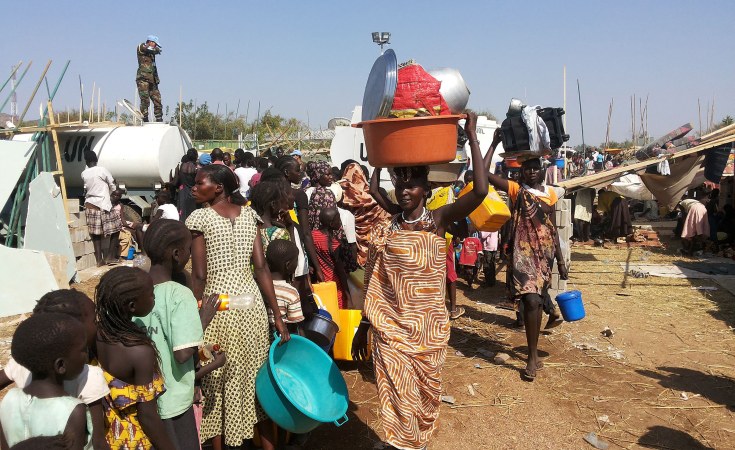As 'Lost Boys' of Sudan who know the pain of conflict, we are appealing to the leaders of our young nation to observe a Christmas ceasefire.
Come to the negotiating table. Compromise for the sake of unity and peace!
We are adding our voice to those of our youth, along with the religious, ethnic and community leaders of our country. Our leaders must stop the killings and put their personal ambitions aside for the sake of national unity and peace.
For most of our childhood, we lived in hiding or in refugee camps. When the world celebrated the birth of Christ - the festival of peace - we knew only hunger, fear, deprivation and loss.
Events of the past week have evoked the nightmares of that past. None of us have slept, eaten, or been able to work. We have been glued to the news stories and social media from our country, locked on to our SKYPE accounts and cell phones.
With the 2005 peace agreement between the Sudanese government in the north and those who fought for human rights in the south – followed by the independence of South Sudan in 2011 - we thought the worst was over. Although our new nation had no experience of democracy and no army of skilled technocrats to build the institutions of open government, we hoped no more children would have to endure the loss of families, homes, land, cattle and culture or to know conflict, hunger and disease as we did.
We ask our leaders to stop inciting violence, to stop propagating ethnic hatred. Respect the constitutional democracy of South Sudan. Respect individual and human rights. Deal with crimes through due process of law.
Two weeks ago, flights into South Sudan were filled with our development partners, the private sector and non- governmental organizations, working with us to build a new nation. Today they are fleeing in fear.
We ask our regional allies and our partner nations to help South Sudan create the conditions to end the fighting. Local and international civil society organizations and media institutions should not reinforce stereotypes or inflame fears. The vast majority of our people want to live in peace.
This is our country. Men and women of goodwill all across South Sudan should make our voices heard. We must have the courage to give our children a chance to live.
Gabriel Bol Deng and Valentino Achak Deng are part of the generation of the Lost Boys of Sudan who were airlifted from refugee camps in Kenya to asylum in the United States. They are supporting the people of South Sudan by building primary and secondary schools in their villages. The best-selling 2006 novel by Dave Eggers, "What is the What," is based on the experiences of Valentino Achak Deng. Francine Prose, writing in the New York Times, called Deng's story "a nightmare of chaos and carnage punctuated by periods of relative peace lasting just long enough for him to catch his breath".


